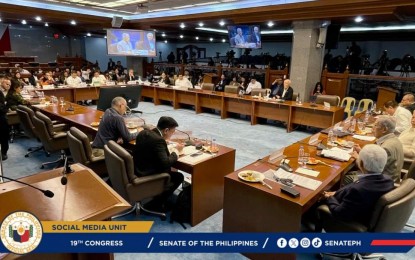
CHARTER REFORM HEARING. The subcommittee created by the Senate under its Committee on Constitutional Amendments and Revision of Codes commences Monday (Feb. 5, 2024) the public hearing on Resolution of Both Houses (RBH) No. 6, proposing amendments to certain economic provisions of the 1987 Constitution filed by Senate President Juan Miguel Zubiri, Senate President Pro Tempore Loren Legarda and Senator Sonny Angara. The public hearing was attended by 1987 Constitution framers, other legal luminaries, and economists as resource persons. (Photo courtesy of Senate)
MANILA – Economists invited by the Senate on Monday expressed their support to the proposed amendments in the economic provisions of the Constitution under the Resolution of Both Houses (RBH) No. 6.
Former National and Economic Development Authority (NEDA) director general Gerardo Sicat told the subcommittee discussing RBH 6 that the restrictive economic provisions in the Constitution have been "the prominent provisions of law that cannot be changed for which we have suffered as a nation in failing to achieve the goals of economic development over a long period of time."
"It has made our country more subject to greater volatility because of the failure to achieve major continuous progress in our development efforts," Sicat said.
These economic provisions, he said, are the main cause why the Philippines is still lagging behind its neighbors in the Southeast Asian region.
"Those provisions have hampered this progress because we failed to invite or bring in foreign capital that is so critical to a country that has an insufficient amount of savings to generate that high level of development," Sicat added.
Sicat, a member of the advisory board of the Foundation for Economic Freedom (FEF), attended the public hearing with former Finance secretary Margarito Teves, also an officer of the group.
The FEF has been advocating for the lifting of the restrictive economic provisions in the 1987 Constitution, seeing these as a binding constraint to the country's economic growth and development.
"We believe that the removal of these restrictive economic provisions would send a clear and compelling message to foreign investors signaling a warm welcome to their investments and business operations in the Philippines," Teves told senators.
He explained that the enactment of laws such as the Public Services Act, Foreign Investment Act, and the Retail Trade Liberalization Act is not enough as the Philippines is still poor in attracting foreign direct investments (FDIs).
Mixed reactions from legal experts
However, legal luminaries like Supreme Court (SC) former chief justice Hilario Davide, who also formed part of crafting the 1987 Constitution, stood firm on opposing charter change, pointing out that "there are no valid, serious, and compelling reasons" to amend the 1987 Constitution saying what Filipinos need is the full implementation of its principles and state policies.
"If at all, there is a need to amend the Constitution, it must be based on the most compelling ground or reasons. It must, foremost, be for the best interest of the country and the people now and in the future and not for a chosen few; it is to solve serious problems, not to create new ones; it must be in pursuance of and in compliance with the declared principles and state policies," he said.
Former SC associate justice Adolfo Azcuna, meanwhile, suggested that the Senate and House of Representatives should meet and discuss how to proceed with the RBH 6.
"The ideal way is to have resolutions of both Houses worded the same way that's why it's called resolution of both Houses. It should not differ and it should be approved the same way with the same wording. That's why a joint hearing is not necessary but you should caucus together," Azcuna said.
"So that there's no conflict. If it is approved by three-fourths of the Senate and approved by three-fourths of the House then you submit it for a plebiscite already. Yan po ang solusyon (That's the solution)," he added.
Senator Sonny Angara, designated to lead the subcommittee Under Committee on Constitutional Amendments and Revision of Codes, opened the first public hearing on RBH 6 which proposes to amend restrictive economic provisions of the Constitution.
Filed by Angara, Senate President Juan Miguel Zubiri, and President Pro Tempore Loren Legarda, RBH 6 specifies that only Section 11 of Article XII or the National Patrimony and Economy; Paragraph 2, Section 4 of Article XIV or the Education, Science and Technology, Arts, Culture, and Sports; and Paragraph 2, Section 11 of Article XVI or the General Provisions will be discussed and reviewed to foster more leniency in foreign participation in public services, education and the advertising industries. (PNA)
